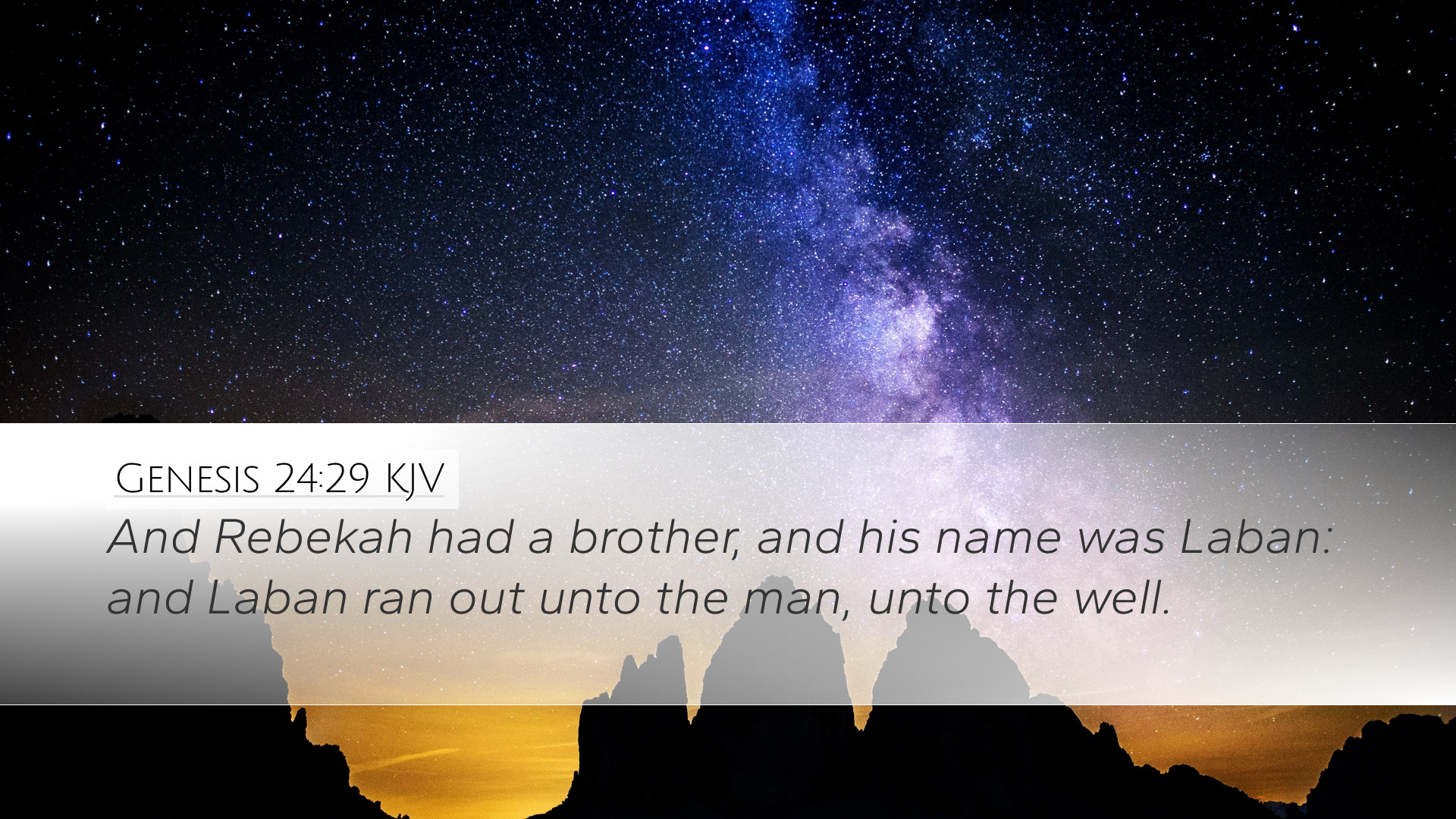Commentary on Genesis 24:29
Genesis 24:29 states: "And Rebekah had a brother, and his name was Laban: and Laban ran out unto the man, unto the well." This verse introduces Laban, a significant character in the narrative and provides insight into the unfolding events of Abraham's servant seeking a bride for Isaac. This commentary seeks to explore the depth of meaning and implications of this verse, drawing from several respected public domain commentaries.
Contextual Overview
The chapter revolves around the journey of Abraham's servant, sent to find a suitable wife for Isaac. This mission is of crucial importance in biblical lineage, as the covenant blessings are to be passed through Abraham's progeny. Thus, the character of those involved, including Laban and Rebekah, must be examined.
Insights from Matthew Henry
Matthew Henry notes that Rebekah's introduction of Laban is not merely casual; it signifies the importance of family involvement in such decisions. Laban, as a brother, plays a pivotal role in the cultural and familial context of the time.
-
Family Relationships: Henry emphasizes the relevance of family unity and support in significant life decisions. Laban's title as Rebekah's brother indicates a familial tie that would influence the acceptance of the suitor.
-
Cultural Significance: The action of Laban running to meet the servant shows eagerness and willingness to engage in the proceedings, which was customary in Eastern societies, especially concerning marriage.
Albert Barnes’ Perspective
Albert Barnes offers a detailed analysis of Laban's character and the implications of his actions. His commentary suggests that Laban's interjection reflects deeper themes of hospitality and recognition of divine providence.
-
Character Sketch of Laban: Barnes highlights that Laban represents a transitional character; while initially cautious and practical, he also possesses traits of shrewdness that may influence future events in the narrative.
-
Recognition of God’s Hand: Barnes points out that Laban’s running to meet the servant signifies a realization of the servant’s divine mission. The recognition of God's providence was a recurring theme throughout the scripture, suggesting that Laban could sense the importance of this meeting.
Adam Clarke’s Analysis
Adam Clarke delves into the biblical text with an insightful examination of the names and meanings involved in this passage. Clarke’s observations underscore the importance of understanding characters through their actions and relationships.
-
Name Significance: Clarke points out that the name "Laban" means "white" in Hebrew, which could symbolize purity or brightness in this context. It invites deeper reflection on Laban's character as well as his role in the narrative.
-
Laban’s Response: Clarke discusses that Laban’s immediate run to the well signals eagerness, highlighting cultural hospitality values central to Middle Eastern customs. This act can also be interpreted as part of the unfolding story, emphasizing Laban's central role in the events to come.
Theological Implications
This verse serves as a bridge between the call of Abraham and the fulfillment of God's promises through Isaac. The emergence of Laban introduces complexities in familial loyalty, hospitality, and the unfolding of God's covenant plan.
-
Divine Providence: The mention of Laban suggests that God's workings extend beyond immediate characters. Preserving the lineage required interaction and response, which Laban's eager approach represents.
-
Interpersonal Relationships: Critical analysis shows that the dynamics between characters such as Abraham's servant, Rebekah, and Laban form a web of responsibility and response, echoing the broader biblical themes of community and familial bonds.
Conclusion
Genesis 24:29 is a rich verse that encapsulates much of the thematic undercurrents in the biblical narrative. With insights drawn from respected commentaries, we can see how Laban's introduction is not simply incidental but transformative in the context of divine plans and human relationships. For pastors, students, theologians, and Bible scholars, examining such details prompts a deeper understanding of the implications of familial relations and divine providence in scripture.


